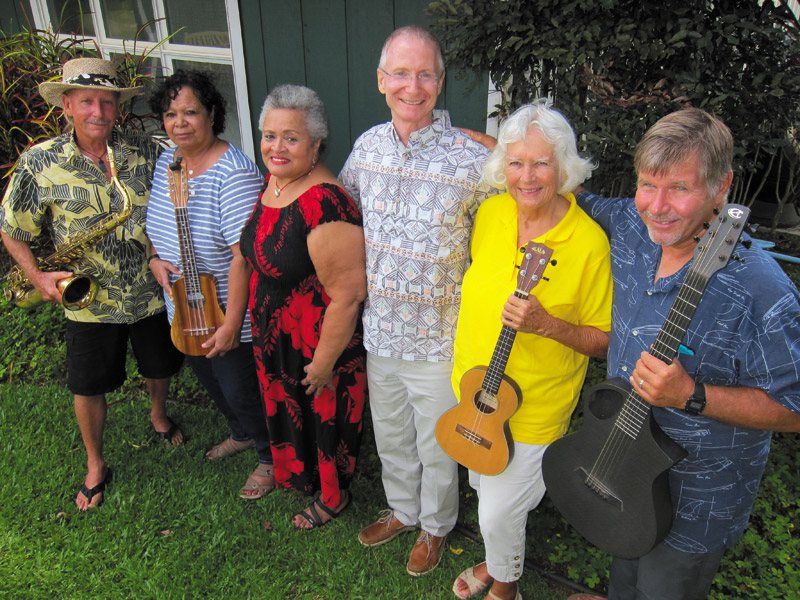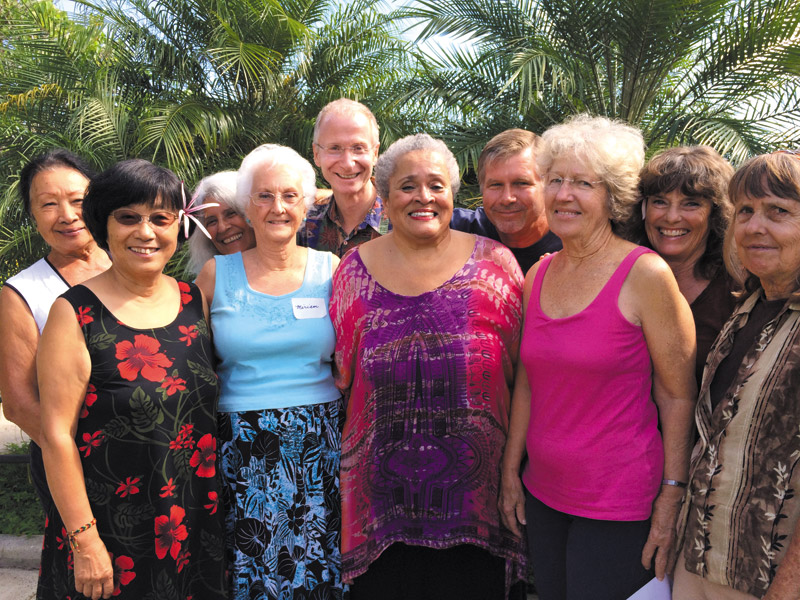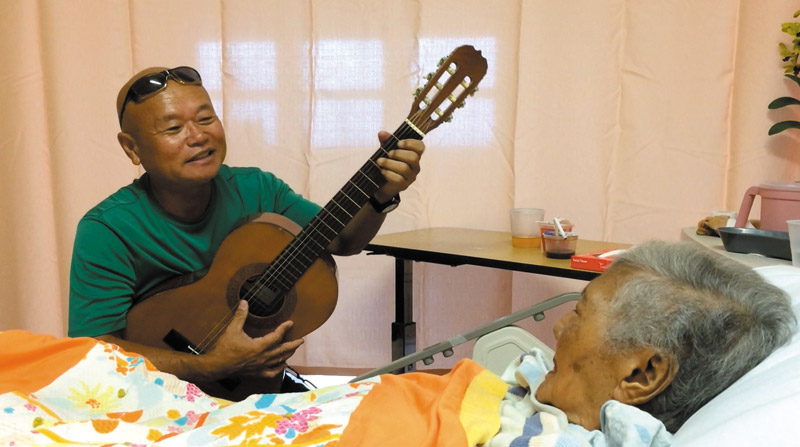The Universal Language

Members of Kaua‘i Hospice’s Transitional Music Program — (from left) Chuck Reed, Kawehi Martin, Sharon West, Jeffrey Pears, Sylvia Partridge and Ross Barker — volunteer their time and talents to help ease the pain and suffering of patients. COCO ZICKOS PHOTO
Musician Ross Barker was kind enough to gift a woman nearing the end of her life, under the care of Kaua‘i Hospice, the sweet melodies of her favorite country music artist, Waylon Jennings.
But it was the gift Barker received in return that was unexpected. As soon as he picked up the musical tempo and shifted to Jennings’ rebellious outlaw harmonies, including I’m a Ramblin’ Man, a big grin stretched across her face and Barker received a hearty thumbs-up.
“And that about got me crying,” he says.
Barker is a singer, guitarist, banjoist and mandolinist, and one of about 50 voluntary musicians who serve the Kaua‘i Hospice’s Transitional Music Program. The program was founded by Lori Miller, Kaua‘i Hospice’s executive director, to provide music to patients and help ease their pain and suffering as they experience major transitional periods, including chronic illnesses, palliation and dying. Since 2015, musicians have been matched up with individual patients according to a family’s musical request, which can range from Hawaiian and Japanese serenades to gospel and country.
The program also sends musicians to independent living and skilled nursing facilities like Regency at Puakea and Garden Isle Rehabilitation and Healthcare, where they perform for groups. The musicians, who also formed a choir, regularly conduct candlelight memorial services at these locations so that guests can pay tribute to friends and family through harmonies.
Each experience is steeped in profound meaning for the musicians, and Barker’s link to the woman he played country music for persisted even after she passed away. Her family sent Barker the patient’s favorite biography of Jennings to serve as a reminder of the happy moment they all shared together.
“So that’s a connection that will stay with me forever,” he says.
Chuck Reed, a saxophone player, recalls a similar experience with a patient who wasn’t responsive until Reed started playing upbeat songs that got the man’s foot tapping.
“Music is the one thing that can get through to them,” says Reed.
He says it’s all about finding that “soft spot.” A spot that Sharon West, the program’s choral director, discovered during a recent performance at Regency at Puakea. The choir put on an improvisational show where they passed out percussion instruments to audience members to play along. Needless to say, everyone was singing and dancing in no time.
“Those people were on fire,” says West with a laugh. “They loved it and we loved them. That was a party.”
Jeffrey Pears, Kaua‘i Hospice’s bereavement care coordinator, who heads the Transitional Music Program and also sings in its choir, says that kind of response happens all the time. The music serves as a connection between not only the person it’s being played for, but also the family members and musicians. He remembers when Reed played for a man who loved old-school rock’n’roll music and whose nickname was “Detroit Bob.” A couple of days before the man passed away, he came out of his semi-comatose state while listening to Reed’s jams on the saxophone, and was moved enough to bob his toes.
“He was enjoying music even in the 11th hour when he was preparing to leave,” says Pears. “I saw the joy. And he was able to whisper to both of us, ‘Thank you.'”
Whether it’s Elvis Presley, Frank Sinatra or Tony Bennett, patients typically have some kind of positive association to a genre of music that stimulates fond memories.

About 50 singers and instrumentalists participate in Kaua‘i Hospice’s Transitional Music Program, including (from left) Polei Palmeira, Sonia Song, Louise Arakaki, Miriam Pearson, Jeffrey Pears, Sharon West, Ross Barker, Sue McLaughlin, Penny Prior and Kaila Ritchie.
“The music, I believe, helps to make those reconnections in the brain — the neural pathways — so that they can access not only the memories, but the power of speech,” says Pears. “It’s a great tool to offer the music as a way to let go.”
And since Kaua‘i’s host culture is steeped in musical traditions, it made even more sense to offer such a program, especially when cultural practitioners like Kawehi Martin, who plays ‘ukulele and sings, are able to fulfill the many Hawaiian musical requests made by families for their loved ones.
“My heart belongs to working with people that are less fortunate,” says Martin, who likes to volunteer for special causes like the Transitional Music Program.
It takes commitment to be a part of the group, especially members of the choir who regularly gather to rehearse. But the rewards, according to the volunteers, are worth the time.
“I really realize how meaningful this program is to people and how powerful music can be,” says Reed.
West agrees. “Music is really so special in the way that it communicates with people,” she says. “This is the most precious experience you can have; to let yourself give this to someone. You don’t have to be a professional musician or player, you just have to bring your heart.”
Visit kauaihospice.org for more information on the program.






